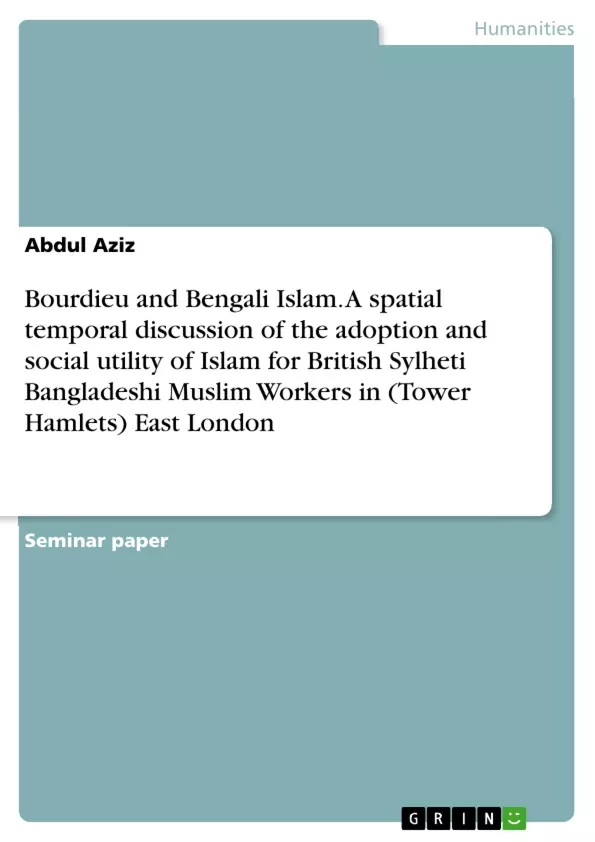This work explores the spiritual thought and bodily work that has been an integral part of Islamic faith. The discussion in the work aims to examine the Islamic process of spiritual conversion and bodily work that began for the Bangladeshis with migration and human capital investments defined by Arabic power that would provide the basis of identity and social organization.
The discussion asserts the argument that the Islamic faith, through the reproductions of kin networks, as well as the operation of a specific set of social practices and social action suffused with Islamic representations, was reproduced by the Bengali workers, replicated through migration within the predominance of the family to transform the urban space of the London borough Tower Hamlets into an sub-Islamic field with religious citizens with religious agency and identities.
A social constructionist approach was undertaken for the study which aimed to provide an additional insight into a number of keys areas with a distinct focus on faith and how faith as a social lexical marker affected the first and second generation of the Bangladeshi’s experiences and views pertaining to social solidarity and work. The research aimed to explore the mutually constituted relationship of the Bangladeshi people of Tower Hamlets, the social structures, the spheres of Tower Hamlets, the hybrid actors, their networks, their habitus and the reproduction of the distinctly ethnic and islamicized field and capitals in social life.
Inhaltsverzeichnis (Table of Contents)
- Abstract
- Introduction
- The Past is Prologue: The Historical Significance of Islam in Work for Bengalis
- The Consecration and Social Utility of Islam for Bengalis
- Understanding Islam at a Local Context
- Globalisation and Arab Influence on British Islam
- Bourdieu, Durkheim and Weber on Islam
- The significance of Bengali Kinship
- Kinship networks
- Summary
Zielsetzung und Themenschwerpunkte (Objectives and Key Themes)
This booklet aims to explore the role of Islam in the lives of British Bangladeshi Muslims in Tower Hamlets, East London. It examines the adoption and social utility of Islam, focusing on how it has shaped the cultural and social practices of this community. The discussion draws on the theoretical frameworks of Bourdieu, Durkheim, and Weber to analyze the significance of Islam in work, kinship networks, and the reproduction of cultural capital.
- The adoption and social utility of Islam for British Bangladeshi Muslims
- The impact of Islam on the cultural and social practices of the community
- The significance of kinship networks in the Bangladeshi community
- The role of Islamic cultural capital in the social lives of Bangladeshis
- The relationship between Islamic faith and work for Bangladeshi Muslims
Zusammenfassung der Kapitel (Chapter Summaries)
The Introduction sets the stage for the discussion, outlining the structure and focus of the booklet. "The Past is Prologue" explores the historical significance of Islam in the lives of Bangladeshis, tracing its roots and examining how it has shaped their understanding of work. The following chapters delve into the social utility of Islam, exploring its impact on kinship networks, cultural capital, and the development of an Islamicized field in Tower Hamlets. The chapter "Globalisation and Arab Influence on British Islam" examines the impact of globalization and Arab influence on the religious landscape of Britain.
Schlüsselwörter (Keywords)
Key words and concepts explored in this text include Bourdieu, Bengali, Islam, Muslim, workers, agency, kinship, cultural capital, social networks, and the Islamic field.
- Citar trabajo
- Abdul Aziz (Autor), 2017, Bourdieu and Bengali Islam. A spatial temporal discussion of the adoption and social utility of Islam for British Sylheti Bangladeshi Muslim Workers in (Tower Hamlets) East London, Múnich, GRIN Verlag, https://www.grin.com/document/502536



